The Intel Kaby Lake-X i7 7740X and i5 7640X Review: The New Single-Threaded Champion, OC to 5GHz
by Ian Cutress on July 24, 2017 8:30 AM EST- Posted in
- CPUs
- Intel
- Kaby Lake
- X299
- Basin Falls
- Kaby Lake-X
- i7-7740X
- i5-7640X
Civilization 6
First up in our CPU gaming tests is Civilization 6. Originally penned by Sid Meier and his team, the Civ series of turn-based strategy games are a cult classic, and many an excuse for an all-nighter trying to get Gandhi to declare war on you due to an integer overflow. Truth be told I never actually played the first version, but every edition from the second to the sixth, including the fourth as voiced by the late Leonard Nimoy, it a game that is easy to pick up, but hard to master.
Benchmarking Civilization has always been somewhat of an oxymoron – for a turn based strategy game, the frame rate is not necessarily the important thing here and even in the right mood, something as low as 5 frames per second can be enough. With Civilization 6 however, Firaxis went hardcore on visual fidelity, trying to pull you into the game. As a result, Civilization can taxing on graphics and CPUs as we crank up the details, especially in DirectX 12.
Perhaps a more poignant benchmark would be during the late game, when in the older versions of Civilization it could take 20 minutes to cycle around the AI players before the human regained control. The new version of Civilization has an integrated ‘AI Benchmark’, although it is not currently part of our benchmark portfolio yet, due to technical reasons which we are trying to solve. Instead, we run the graphics test, which provides an example of a mid-game setup at our settings.
At both 1920x1080 and 4K resolutions, we run the same settings. Civilization 6 has sliders for MSAA, Performance Impact and Memory Impact. The latter two refer to detail and texture size respectively, and are rated between 0 (lowest) to 5 (extreme). We run our Civ6 benchmark in position four for performance (ultra) and 0 on memory, with MSAA set to 2x.
For reviews where we include 8K and 16K benchmarks (Civ6 allows us to benchmark extreme resolutions on any monitor) on our GTX 1080, we run the 8K tests similar to the 4K tests, but the 16K tests are set to the lowest option for Performance.
For all our results, we show the average frame rate at 1080p first. Mouse over the other graphs underneath to see 99th percentile frame rates and 'Time Under' graphs, as well as results for other resolutions. All of our benchmark results can also be found in our benchmark engine, Bench.
MSI GTX 1080 Gaming 8G Performance
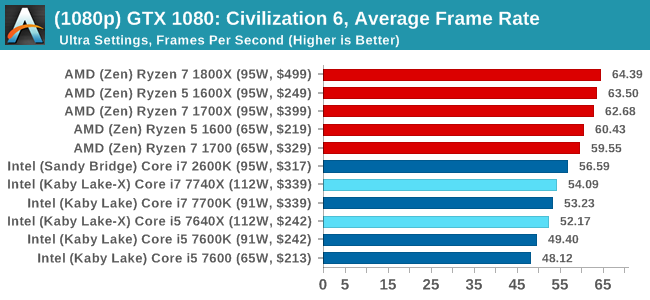
1080p

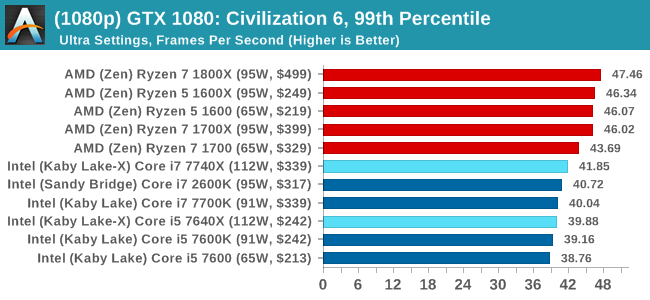
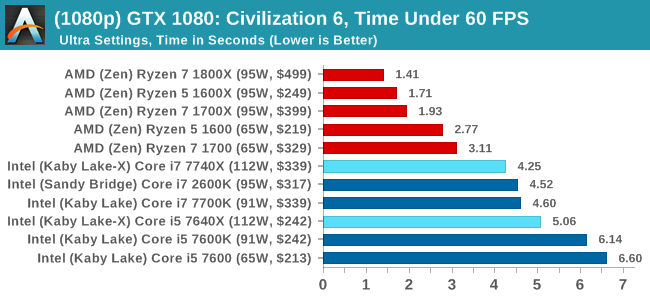
4K
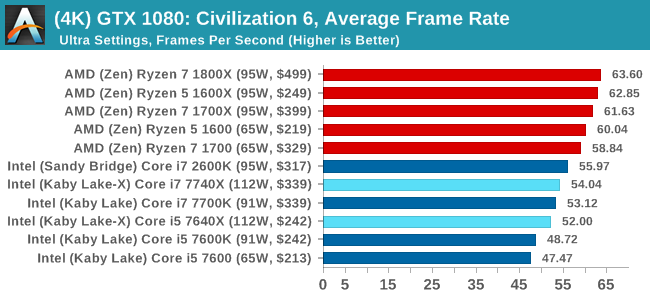
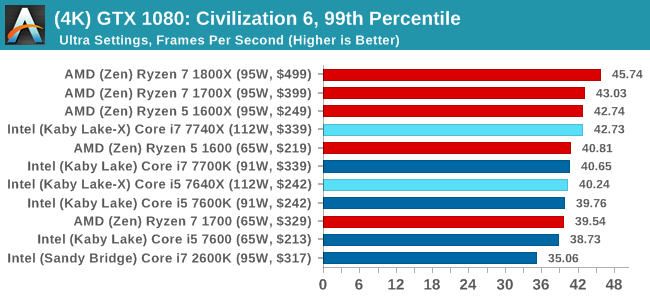
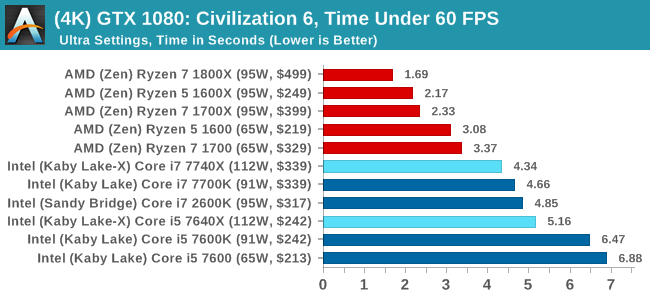
8K
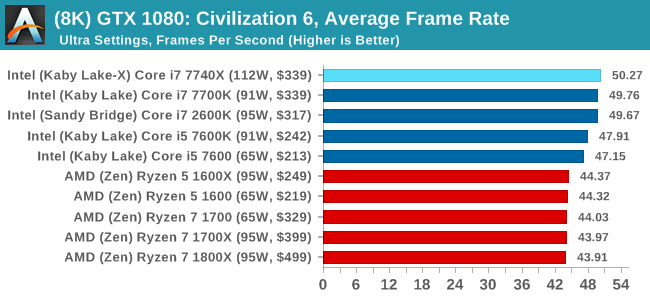
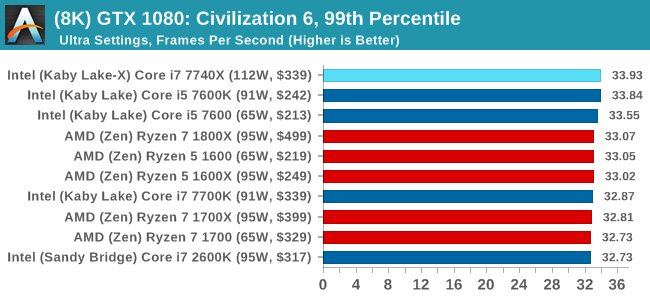
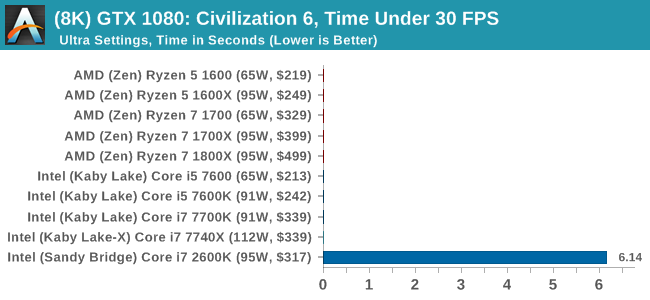
16K
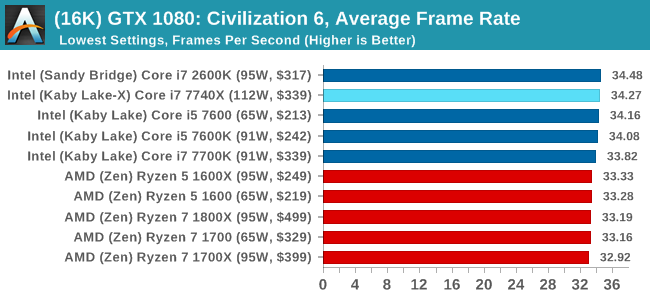
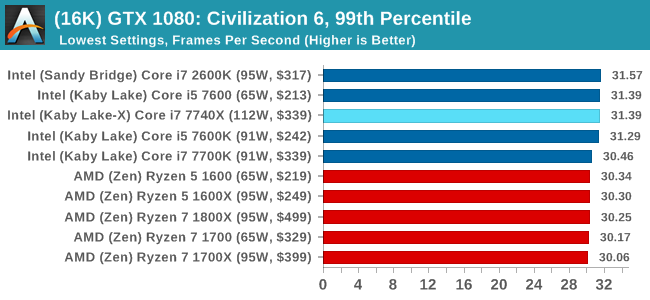
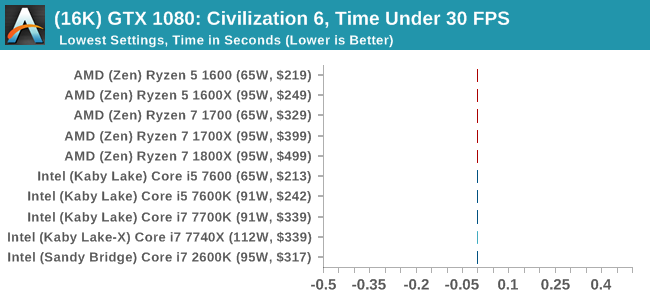
ASUS GTX 1060 Strix 6GB Performance

1080p

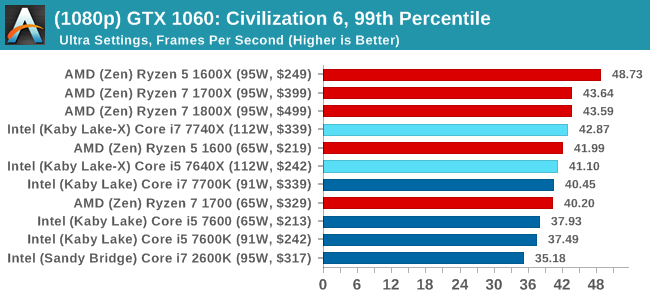
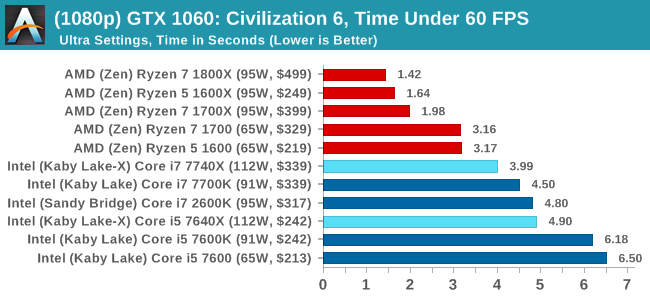
4K
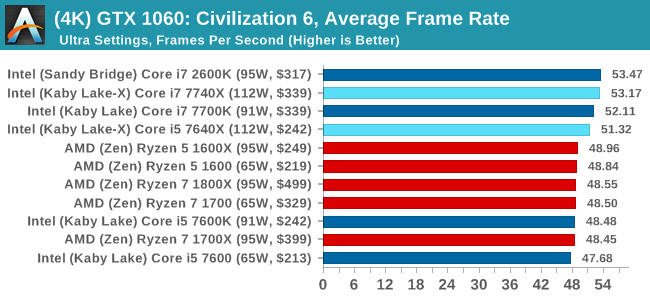
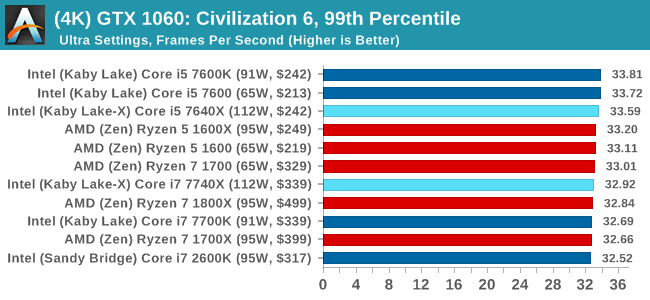
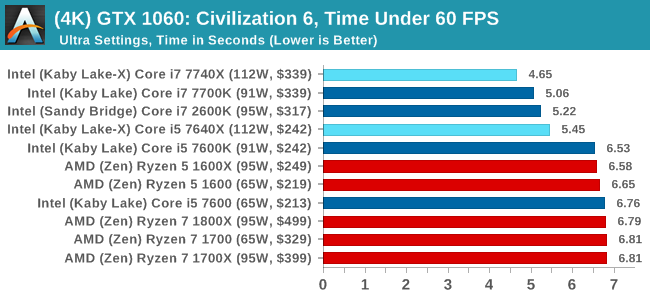
Sapphire R9 Fury 4GB Performance
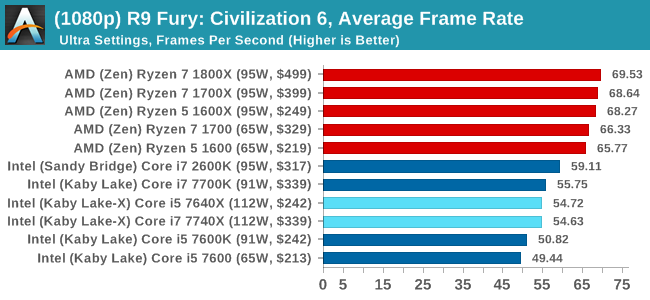
1080p

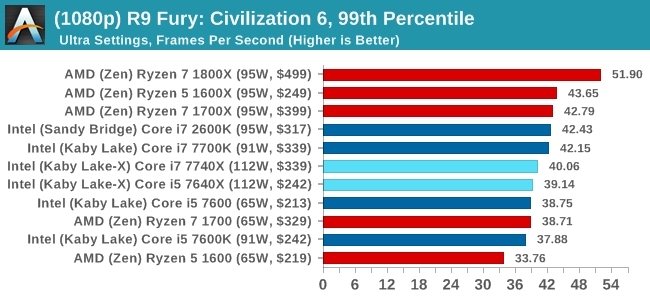
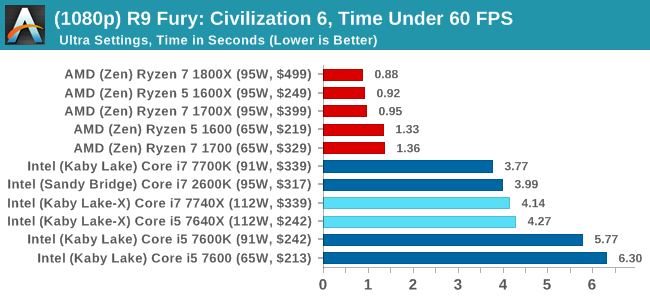
4K
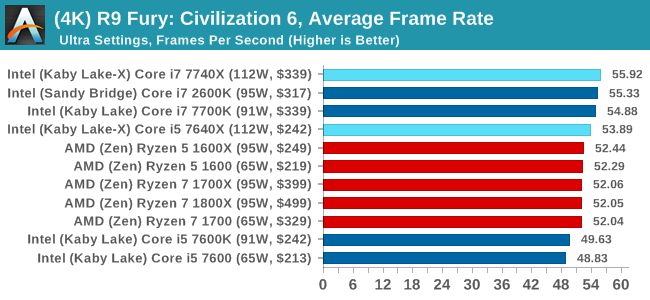
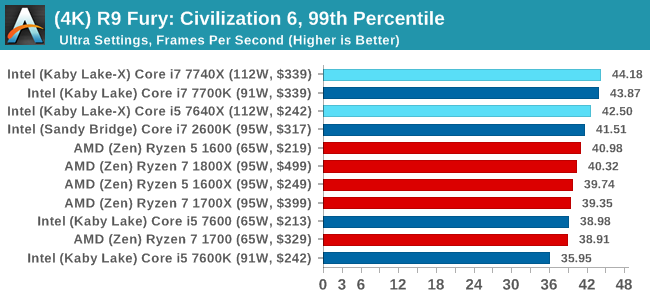
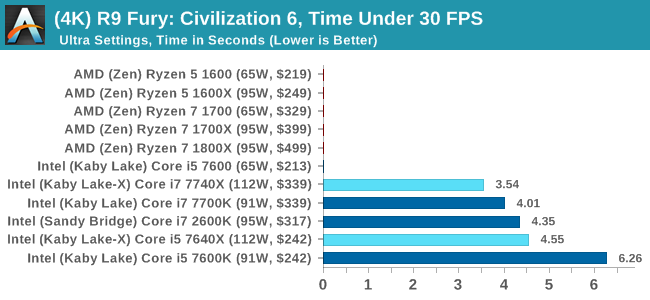
Sapphire RX 480 8GB Performance
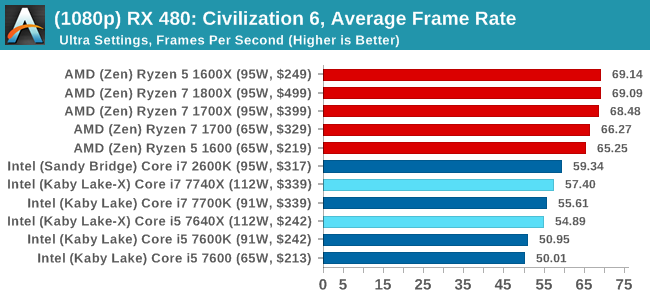
1080p

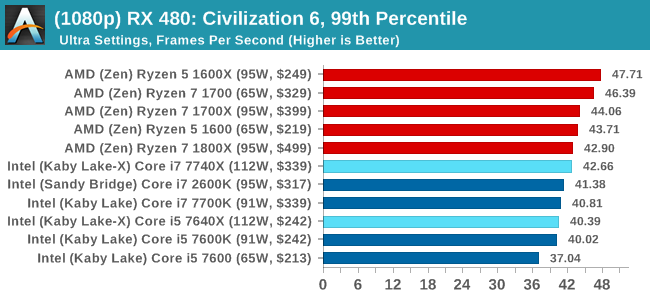
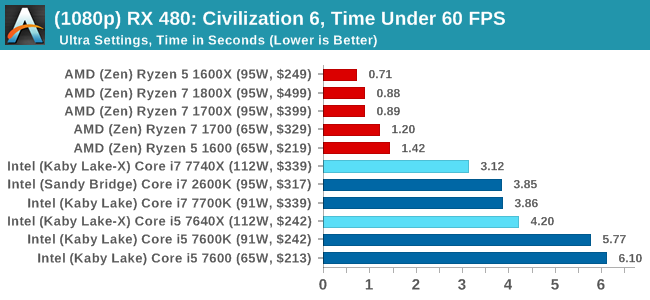
4K
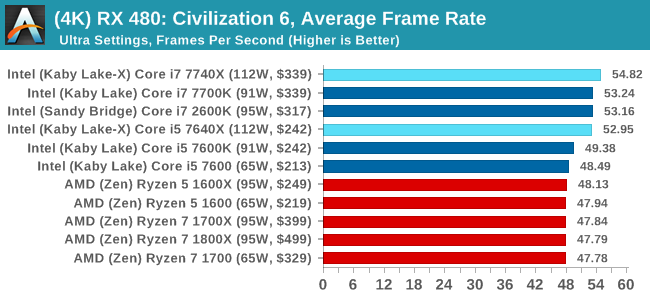
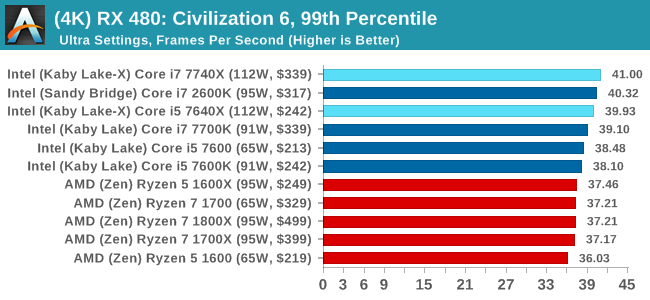
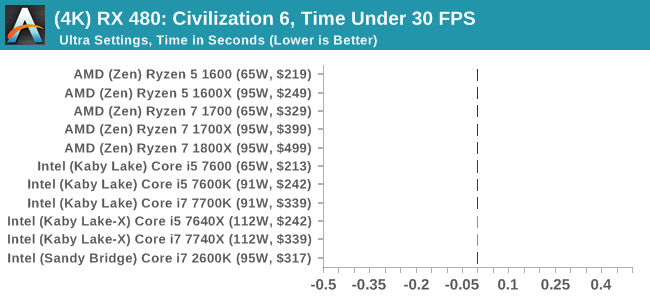
Civilization 6 Conclusion
In all our testing scenarios, AMD wins at 1080p with minor margins on the frame rates but considerable gains in the time under analysis. Intel pushes ahead in almost all of the 4K results, except with the time under analysis at 4K using an R9 Fury, perhaps indicating that AMD is offering a steadier range in its frame rate, despite the average being lower.



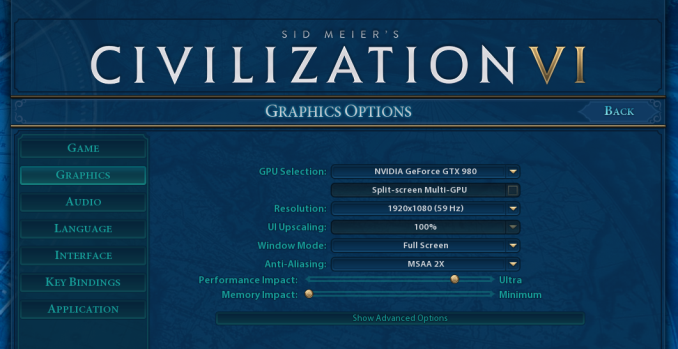








176 Comments
View All Comments
djayjp - Monday, July 24, 2017 - link
Ian, why didn't you check if the OC was being thermally throttled? Easy enough to check this. And easy enough to see if it's the temperature of the cores or not. Surprising you wouldn't include temperature or power consumption data with the OC (though I understand this hasn't typically been a focus of AT). Another site demonstrated throttling at ~95+ C.mapesdhs - Monday, July 24, 2017 - link
Is that the same site which showed that the TIM Intel is using is just not allowing the heat to get from the die to the cap? Die temp shoots up, cap temp doesn't, even with a chiller cooler.melgross - Monday, July 24, 2017 - link
This article gives a good reason why huge numbers of core are a waste of money for most users.http://www.computerworld.com/article/3209724/compu...
Old_Fogie_Late_Bloomer - Monday, July 24, 2017 - link
Yeah, don't bother starting the article unless you're willing to create yet another useless online identity. Shame, since it seemed moderately interesting, but...alpha754293 - Monday, July 24, 2017 - link
re: overclockingThat works well for the occasional heavy workload, but if you are going to be constantly running at peak load (like I did for engineering analysis), overclocking of any kind, from my experience, isn't worth the dead core or entire CPU.
I've already fried a core on the 3930K once before taking it up from 3.2 GHz stock, 3.5 GHz max TurboBoost to 4.5 GHz.
mapesdhs - Monday, July 24, 2017 - link
Alas this stuff does vary according to the invidual CPU, mbd, RAM, etc. What cooling did you use? Could also be the vcore was too high - a lot of SB-E users employed a high vcore, not realising that using a lower PLL would often make such a high vcore unnecessary. It's even more complicated if one fills all 8 RAM slots on a typical X79 mbd.alpha754293 - Tuesday, July 25, 2017 - link
The cooling that I was using was Corsair H80i v2.The temps were fine and were consistently fine.
RAM was 8x 8 GB Cruical Ballistix Sport I think DDR3-1600? Something like that. Nothing special, but nothing super crappy either. I actually had the entire set of RAM (all eight DIMMs RMA'd once) so I know that I got a whole new set back when that happened about oh...maybe a-year-and-a-half ago now? Something like that.
Motherboard was Asus X79 Sabertooth.
Yeah, I had all 8 DIMM slots populated because it was a cheaper option compared to 4x 16 GB. Besides, using all 8 DIMMs also was able to make use of the quad-channel memory whereas going with 4x 16 GB - you can't/won't (since the memory needed to be installed in paired DIMM slots).
That CPU is now "castrated" down to 4 cores (out of 6) because 1 of the cores died (e.g. will consistently throw BSODs, but if I disable it, no problems). Makes for a decent job scheduler (or at least that's the proposed task/life for it).
Dr. Swag - Monday, July 24, 2017 - link
Hey Ian, on the first page you listed the turbo of the 7700k as 4.4, whereas it's actually 4.5Yuriman - Monday, July 24, 2017 - link
Shouldn't the 7700K read "4.2-4.5ghz" rather than 4.2-4.4?Dug - Monday, July 24, 2017 - link
On RoTR-1-Valley 1080p it shows i5 7600k at 141fps and the i7 7700k at 103fps. Have a feeling these might be transposed.